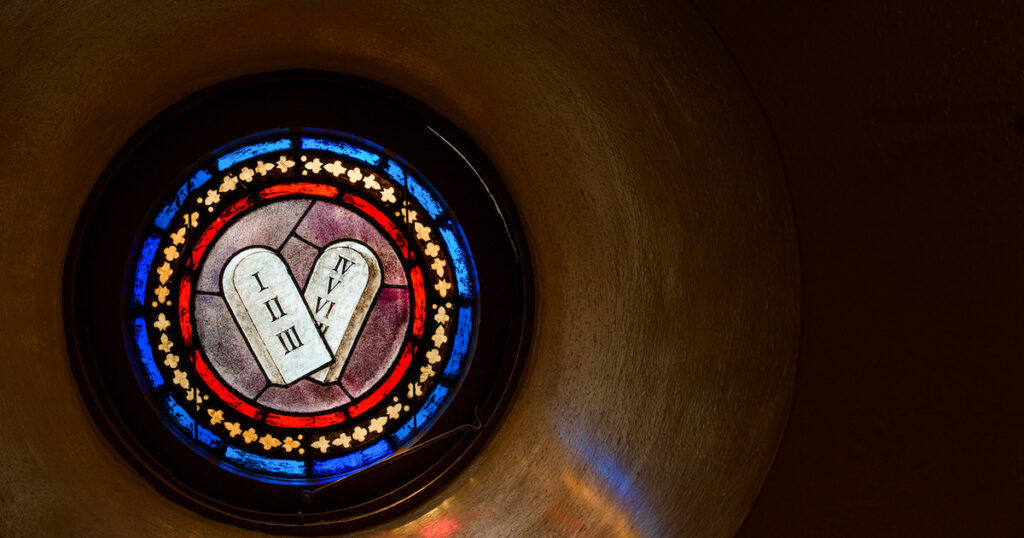The Small Catechism lives in the church’s public prayers and services. We pray the Lord’s Prayer almost every time we gather, and sometimes more than once. The Apostles’ Creed lives in Baptism (at least in part) and in Responsive Prayer I and II, and it’s also an option in any of our Divine Services. The words of Baptism live in the liturgy of Baptism. The Lord’s Supper lives at the heart of any Divine Service.
But what about the first chief part? Where do the Ten Commandments live in the church’s liturgical life? Where do the people of God regularly encounter and use them? Or are they largely restricted to the classroom, to catechesis or confirmation instruction, and so left behind as the Christian moves in adulthood?
In the historic Anglican Communion Liturgy, the priest recited the commandments at the beginning of the service, and after each commandment, the people responded: “Lord, have mercy upon us and incline our heart to keep Thy Law.”
Ten Commandments for Preparation
Lutherans never put the Ten Commandments in the Divine Service. Lutheran Service Book does place them for recitation in the Service of Prayer and Preaching, but the most common historical use among Lutherans has been all but forgotten: preparation to receive the Lord’s Supper.
The catechism makes it explicit in two spots. First, under the fifth chief part in the Small Catechism, you find the little section on how to make confession. Before the pastor we should confess the sins we know and feel in our hearts. But “which are these?” the catechism asks. What sins should we know and feel in our hearts, what sins should trouble and disturb us? The answer: “Consider your place in life according to the Ten Commandments” (Luther’s Small Catechism with Explanation, p. 27, emphasis added).
The person who faithfully and prayerfully spends time with one of these confessional mirrors before communing would scarcely have to be exhorted to go to confession.
The second spot where the commandments are mentioned is “Christian Questions with Their Answers.” These are questions a pastor may use to examine catechumens after instruction, or which a Christian can ask him or herself. Consider:
1. Do you believe that you are a sinner? Yes, I believe it. I am a sinner.
2. How do you know this? From the Ten Commandments, which I have not kept (pp. 40–41).
Confessional Mirror
Lutherans of yesteryear took this examination of the heart in light of the Ten Commandments with the utmost seriousness. And beyond the catechism, they developed a method to examine one’s heart and conscience in light of God’s will expressed in His commandments. It’s usually called a “confessional mirror”; the German term is Beichttafel.
These mirrors consisted of questions a Christian would ask him or herself based on each commandment. Last month, I mentioned what a treasure trove the Treasury of Daily Prayer is. One of its little-known features is hidden away; the “Preparation for Confession and Absolution According to the Ten Commandments” serves as a modern confessional mirror (see Treasury of Daily Prayer, pp. 1464–66).
Consider the first commandment: “You shall have no other gods.” The Small Catechism beautifully summarizes the meaning: “We should fear, love, and trust in God above all things” (p. 11). But have you? What questions might help you dig into this? The Treasury’s Beichttafel offers some helpful questions:
- What or whom do I fear most?
- In what or whom do I trust most for financial security, physical safety, or emotional support?
- Do I fear God’s wrath and therefore avoid every sin?
- Is my love for God evident in my daily life?
- Do I expect only good from God in every situation, or do I worry, doubt, complain, or feel unfairly treated when things go wrong? (Treasury of Daily Prayer, p. 1464)
Do you see how that could help you dig a little more deeply into the commandment?
And what you find in the Treasury is a good beginning. As helpful as it is, the Treasury’s mirror pales a bit beside the confessional mirror found in Lutheran Prayer Companion (Concordia Publishing House, 2018). This mirror provides the most extensive look into each and every commandment, in an exercise called “Self-examination from the Ten Commandments.” Here’s the First Commandment:
O holy and righteous God, who see and hear all things: I come before You now to examine carefully the condition of my soul and to learn how I am, and whether I am on the way of destruction. I am far too corrupt, my heart far too false and deceiving, for me to do it myself. Search me Yourself, O God! Try me and know my thoughts, and make me aware of them by Your Word and Spirit.
- Have I remembered You often, great Maker and Sustainer, Redeemer and Sanctifier?
- Have I used Your will and Your commandments as my guidepost in what I do and do not, and have I always asked myself: “Is this in line with God’s commandment?”
- Have I entertained any detestable thoughts, such as, “There is no God”?
- Have I not honored many idols and thought of myself highly, followed only my own will, and sought only my own glory and satisfaction?
- Have I not feared other men more than God, revered their presence more than God’s presence, and made a greater effort to gain their favor than God’s grace, and done more in love toward them than I would do in love to God?
- Have I not put my trust in great benefactors and in the favor of men?
- Has my heart found its rest, etc., in temporal things such as money, goods, honor, and an easy life, instead of seeking its only delight and joy in the eternal good from which all others come?
- Have I perhaps sought the help of Satan and his sorcerers rather than the help of God and feared their power more than the strength of God?
- Have I had a proper conception of God’s power, omnipresence, righteousness, and grace in order to move myself to childlike fear?
- Has my fear of God also borne true fruit, such as obedience, hatred of evil, remorse for sin, humility, patience, vigilance, and the like?
- Have I sought to know God as the highest good and to love Him above all things?
- Have I to that end diligently sought God’s perfection, majesty, goodness, mercy, power, wealth, and benefits?
- Has my love arisen merely for the sake of those benefits and temporal happiness?
- Have I also detected in myself the fruits of true and genuine love of God, such as hatred of sin, contempt for the world, long-suffering, desire for greater union with God, praise, thanksgiving, and joy?
- What form has my trust toward God taken? Is it a well-founded and childlike trust?
- Have I founded it on God’s goodness, truth, omnipotence, and promise?
- Has this trust worked true fruit in me, such as hope, serenity, courage, and constancy?
- Likewise, what form has my knowledge of God taken? Is it a living or dead knowledge? And do I seek to increase that knowledge? Do I earnestly guard myself against all errors?
- Are all, or even most of, my desires centered on God and His grace? (Lutheran Prayer Companion, pp. 157–58)
It provides questions for each of the commandments, but I want to give the closing prayer as well:
O my God, search me Yourself! Try me and know my thoughts! See if I am on the just way, and lead me in the way everlasting. You alone can understand the heart, which is deceitful and desperately wicked, and uncover all the guile of narcissism. Oh, how much good I have omitted, and how much evil I have committed! What good I find is only external. Rarely is there a true, good intention and good basis of true virtue. Therefore, O mighty and jealous God, make me to hear the thunder of Your holy and immutable Law, to be terrified by the curse and wrath which I have earned, and to turn in penitence to Your grace in Christ! (Lutheran Prayer Companion, p. 161)
Fruitful Meditation
Imagine the fruit of such careful meditation on the Ten Commandments. And think how pious Lutherans regularly meditated before approaching the Supper. This is how they examined themselves in light of St. Paul’s exhortation in 1 Corinthians 11 to “let a person examine himself, then, and so eat…” Or with the similar admonition in 2 Corinthians 13:5: “Examine yourselves, to see whether you are in the faith. Test yourselves.”
The loss of this piety of self-examination via the Ten Commandments explains, at least in part, why we have come to neglect private absolution. The person who faithfully and prayerfully spends time with one of these confessional mirrors before communing would scarcely have to be exhorted to go to confession. Considering one’s place in life according to the Ten Commandments will drive us that way on its own; just typing this out makes me long to hear my confessor’s absolution ring in my ear again. With the confessional mirror as a tool and preparation for receiving Communion as the occasion, the Ten Commandments find their spot again in the church’s liturgical life.





